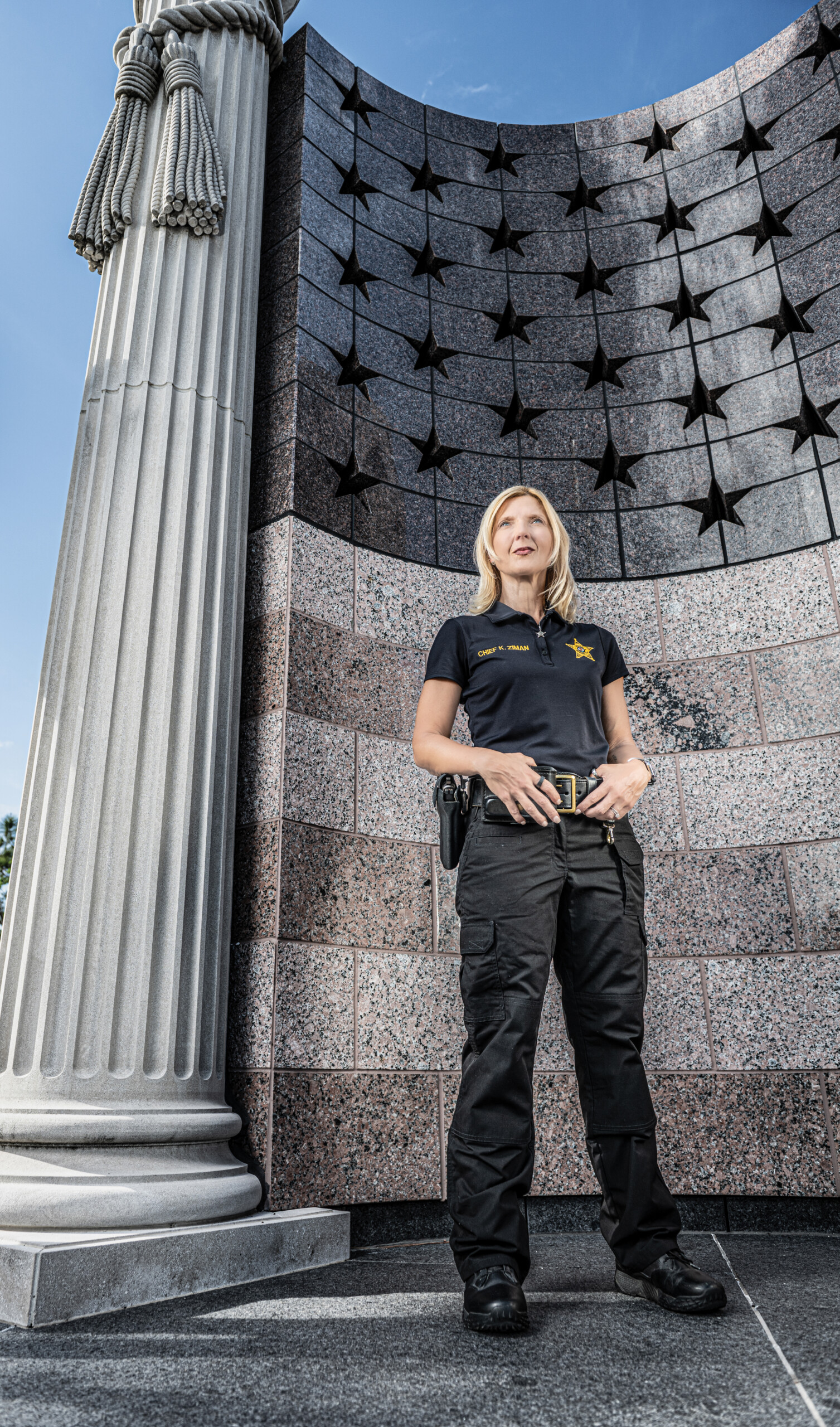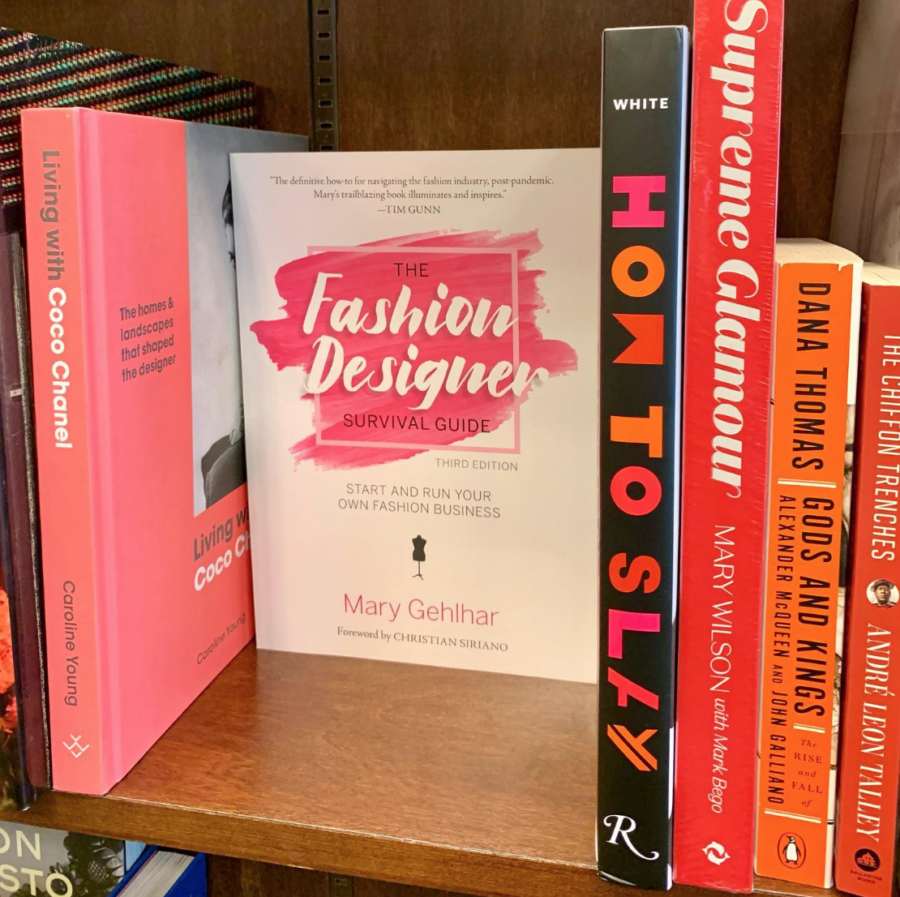Reimagining BLUE
Kristen Ziman Wants to Lift Up Women and Stop the Next Mass Shooter at the Same Time

Photography: D. Paul Graham
Kristen Ziman retired from a 30-year career in policing in 2021. She wrote the book “Reimagining Blue: Thoughts on Life, Leadership, and a New Way Forward in Policing” about her long career, the lessons she has learned along the way, and her current calling as a public speaker.
Kristen Ziman began her police career as a teenage cadet in 1991 and left the profession in 2021 as a chief of police. She served the entire time just outside Chicago in Aurora, Illinois, her hometown, and the second-largest city in the state. Ziman never wanted to be anything other than a cop as a kid, growing up with a father who served in the police department.
“I just wanted to fit in, so I lost myself during my years as a cadet,” she says in her book , “Reimagining Blue: Thoughts on Life, Leadership, and a New Way Forward in Policing.” However, she learned over time that the best way to do her job was not to always be tough and uncompromising, but to be compassionate and treat people on the wrong side of the law as human beings.
Being a female cop, especially one who is 5’4’’ is not easy. Rising all the way to the top in a male-dominated field is nearly impossible. Women make up 12 percent of cops, but less than eight percent of those who are chief of police are female. There are many reasons why Ziman was able to ascend to that executive level, and one of them is that she is incredibly tenacious.

She tells the story in her book about a phrase from a movie and book she loves, “Fried Green Tomatoes.” The quote is: “Don’t you ever say never to me.” It’s uttered twice in the movie, by two different women who are both being counted out by someone else. “One of the hardest lessons I’ve ever had to learn is that people relentlessly and ruthlessly attempt to chop you off at the knees for them to get ahead,” Ziman reveals in her book.
She got along well with other police officers for the first 15 years of her career, and then she hit a human roadblock. She was a sergeant and working on moving up to the rank to lieutenant. A police commander knew of her goal, and he told her that “You will never become a lieutenant in this police department if I can help it.” She was stunned.
When asked about it, she said: “If I would’ve listened to him, I wouldn’t have gone on to become a lieutenant, a commander, and the chief, the first female chief of my police department. I learned to use criticism as fuel. Don’t you ever say never to me has always been my battle cry.”
Ziman also had to deal with women who were either undermining her or indifferent to her situation. She would reach out to women she wanted to be her mentors, and almost all of them would give her the cold shoulder.
So, one of her missions right now is to lift other women up, whether they are police officers or aspiring to be. It doesn’t matter which women come to her or how old they are, whether they are looking for a mentor, asking for advice, or just looking for connection. Ziman will make time for them and she loves doing it.
Another thing Ziman loves doing? Co-hosting “The Hollow Bunny Leadership Podcast” with Sylvia Moyer. Moyer is also a former chief of police, and the two talk about their experiences as leaders, police officers, and women. The two are fast friends and the episodes are a mix of deep thoughts and hilarious conversations (as you might imagine with the name “The Hollow Bunny”).
One of Ziman’s most trusted mentors is professor, minister, and community activist Dr. Vincent Gaddis. He has helped her to better understand systematic racism and the abuse of power. She declared that she’s not “abandoning the notion that laws have to be followed. That’s why we are a democracy of laws, that’s what the United States was built upon. There is this place, I think in the middle where we can lean into one another and have more conversations. Let’s talk to one another, versus barking out orders. And I think it’s where you bring in that humanity.”
The former police chief believes that people are inherently good, they just don’t all stay that way. She saw someone go from inherently good to indescribably bad when her department went through great sacrifices to stop a mass shooter. It was February 15, 2019, and a man had just been fired from a manufacturing plant. He decided to go on a killing spree in the warehouse where he worked, killing five of his former co-workers. He also injured six others, five of them police officers who served under Ziman, before being killed by another officer. One of those officers ended up losing an eye.
“Forcing myself to focus on the mission at hand was the hardest thing I’ve ever had to do,” Ziman said. She had to hang back in command while two people and fellow police officers that she cared deeply about, her wife and ex-husband, were trying to stop the killer. As you might imagine, that day changed Ziman forever. Four years later, she still has the scrap of paper she was given with the names of the dead on it.
Four years later, she continues to try and stop the next mass shooter.
In a conversation with Ziman, she shared the following about mass shooters: “The person who will commit the next mass shooting is in someone’s family, is in someone’s business, is in someone’s church. They’re next to you. And we’re tripping over red flags.”
Ziman is currently working with a host of others through the Federal Justice Department on a comprehensive review of every detail of what happened during the Uvalde mass shooting. The review is “not just of law enforcement,” Ziman stated, but a “comprehensive review of the community. It has been an emotional rollercoaster, interviewing people and, watching the videos. It takes me right back to that familiar feeling on the day of the shooting in my community, and that’s what happens every time there’s a mass shooting for me, is I just, I get that chest tightening feeling, and here we go again.”
The trauma that Ziman went through as a result of the shooting in Aurora was substantial. She also can find it traumatic when she participates in work like she’s doing with the comprehensive review of Uvalde. What does she do to try and heal herself and her pain? Public speaking. She finds the more she speaks out about the mass shooting she’s been through, teaching people the lessons learned, and sharing what approaches to stopping gun violence have been successful, the better she feels. She also has a strong support network that includes her wife, daughter, and son.
For more on Kristen Ziman’s coaching and speaking or to purchase a book go to kristenziman.com.
To read this story in its entirety, subscribe now to the print edition for the full article or get instant access to our interactive digital edition.











